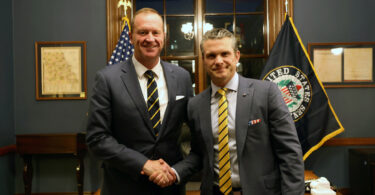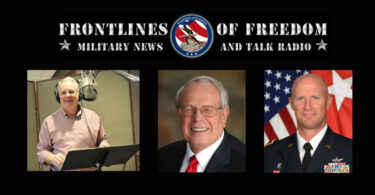By Dr. Meaghan Mobbs
West Point 2008 graduate and former US Army officer
Member, VMI Board of Visitors
The primary role of our military is to deter our nation’s adversaries and, if that falls short, to fight and win our nation’s wars.
But our erstwhile “big stick” is rapidly turning into a mere twig, capable only of irritating our enemies instead of deterring or defeating them.
This becomes especially critical as the United States drifts from competing with China toward potential conflict. Neglecting to acknowledge and adapt to these demands could prove catastrophic.
This vital readjustment calls for scrutinizing the last 22 years of policy and leadership decisions, which have resulted in multiple military failures, deteriorated command climates, and cultural issues.
These factors contribute significantly to recruitment shortfalls, retention problems, and the public perception of the military.
The reasons for the military’s decline are straightforward yet important to understand.
Our military has become entangled in a perilous practice of lowering standards and ignoring crucial data, all for the sake of a misguided political agenda. This has led to the slow erosion of the meritocracy that once characterized our armed forces.
A key example was the arbitrary dismissal of a 2015 study by then Secretary of the Navy, Ray Mabus, of Marine Corps research. This research concluded that gender-integrated combat units did not move as quickly or shoot as accurately as all-male formations, and that women were twice as likely to sustain combat injuries. These disparities were downplayed at the time and reframed as opportunities to train women more extensively and aim for equal fitness standards between men and women.
However, neither the Marine Corps nor the Army upheld their promise of targeted programs aimed at the improvement of physical fitness standard equality based on military occupational specialty. Instead, the worst-case scenario unfolded — negligible support for women wishing to enter combat arms roles and differing standards for men and women doing the same job.
This does not foster strength through diversity; it engenders division through disparity.
Importantly, the negative effects of these varying standards reach beyond mere fairness. These discrepancies, far from benefitting women, make it more challenging for them to earn the trust and confidence of their peers.
In any team-based environment, be it sports, the military, or the corporate world, the team’s strength lies in its unity, cohesion, and collective ability. The standards by which each team member is evaluated and expected to perform critically affect these attributes. The existence of differing standards within the same team can significantly undermine these vital dynamics.
Kristen Griest, one of the first women to graduate from Army Ranger school, stated , “It is wholly unethical to allow the standards of the nation’s premier fighting units to degrade so badly, just to accommodate the lowest-performing soldiers.”
She further contends , “The intent [of a single standard] was not to ensure that women and men will have an equal likelihood of meeting those standards. Rather, it is incumbent upon women who volunteer for the combat arms profession to ensure they are fully capable and qualified for it.”
Time and again, women have demonstrated their ability to fight and contribute effectively to our military.
The heroic efforts of the Cultural Support Teams and Female Engagement Teams in recent conflicts underscore this fact. These teams were formed based on the understanding of women’s unique abilities and perspectives and were able to access places, people, and resources otherwise inaccessible to men.
These successes were born out of recognizing and leveraging the biological differences between men and women, not denying them.
Nevertheless, it seems the Department of Defense prefers to ignore these hard truths. Its failure to confront harsh realities and instead succumb to social pressures puts our military’s lethality and effectiveness at risk.
Our military should be the pacesetter, not a trend follower.
This disregard for standards and evidence-based decision-making has not gone unnoticed by the American public. Confidence in our military, once a reliable pillar of American trust, is dwindling.
Gallup found from 2020 to 2022, confidence dropped by a notable 8 percentage points. The Reagan National Defense Survey found an even sharper decline, with confidence plunging from 70% in 2018 to a mere 45% in 2021. These statistics are alarming and demand attention.
The call to field a military fighting force rooted in realism is not an attempt to prevent women from serving in the military — quite the contrary.
It is a demand to respect data and evidence, and to make decisions that enhance, not undermine, the efficacy of our armed forces.
The military, at its finest, is standards-based and a meritocracy. It must remain as such. It’s time to reaffirm the principles that have ensured its prowess and to use evidence-based decision-making as our foundation.
Only then can we hope to restore the “big stick” and ensure the continued strength and effectiveness of our military in an increasingly hostile world.
Meaghan Mobbs is a senior fellow at the Independent Women’s Forum.








Leave a Comment